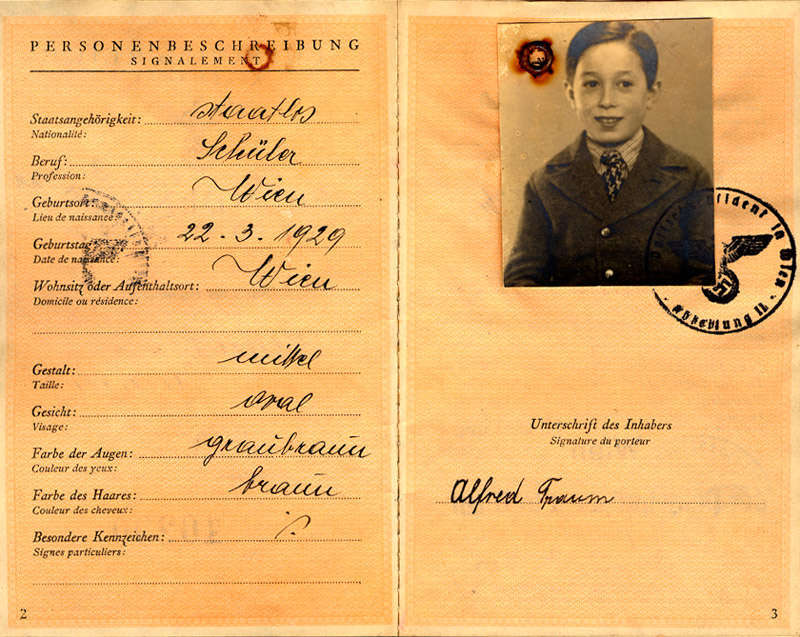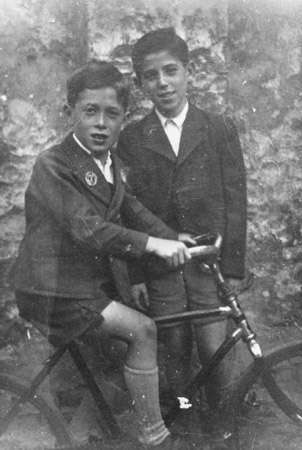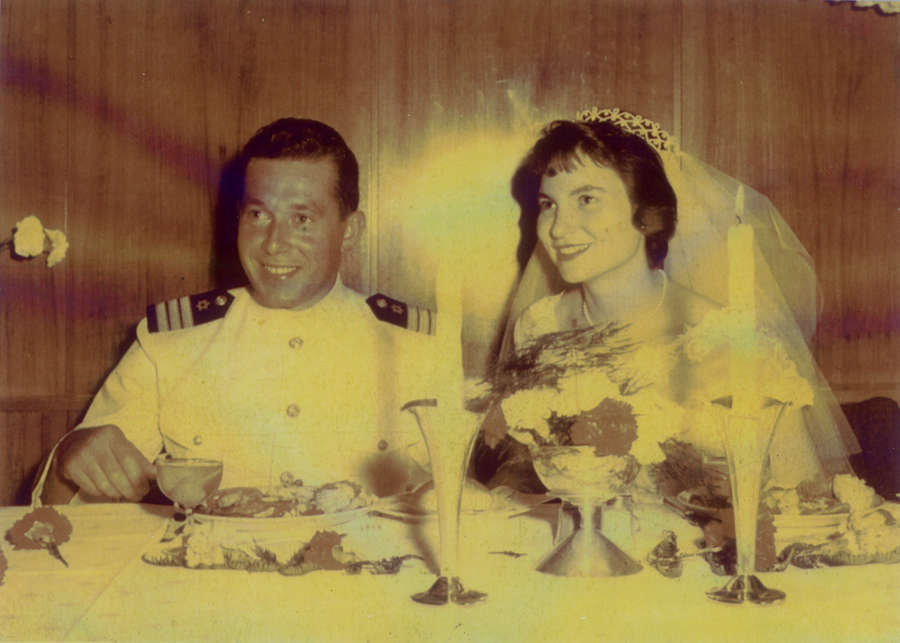Alfred Traum
Our livelihood was taken from us
Alfred Traum was born in March 1929 in Vienna into a traditional Jewish family. On June 20, 1939, ten year old Freddie had to leave for England with his older sister on a "Kindertransport". They lived with a Christian family during the first years in exile.
Until the "Anschluss" [1] my childhood was a happy one. We lived in Meidling [2] – for the most part a non Jewish area. I had many friends. My father, Elias Traum, served in the Austrian army during the First World War and suffered injuries which caused him to be crippled and unable to get around without the aid of two canes. He rarely left the apartment. His source of income was selling all kinds of merchandise and extending credit to the customers who paid in installments (a common practice before stores extended credit and the days of credit cards).
The business was run from home. Customers would make their selections from catalogues or other sources and purchase linens, radios and/or bicycles. After they received their goods, my mother would call on them on a monthly basis to collect the incremental payment. Some customers had bought from us for years and were very satisfied. It was a "win win" situation. We both benefitted from the transaction. I used to accompany my mother on some of those calls. It was fun and I remember it well.
In 1938 things began to change. At first I was shunned by my former friends. Later I was attacked by fellow school students, for example having my school satchel torn from my body and thrown on to the grass. Then a policeman filed a charge against me when I retrieved it from the grass. Later, I was sent to a "school for Jews". We were jeered or attacked by gangs when leaving school on a daily basis. My parents were unable to help. My father was confined to the house.
Some time after the "Anschluss", customers ceased to make further purchases and in some case refused to pay what was owing to us. After some doors were slammed at our faces, my mother would not take me with her. After "Kristallnacht" [3], no one honored their debts anymore. Thus our livelihood was taken from us. All our resources, such as they were, were in the hands of our customers who refused to pay. I don't have a figure, but I do know it was our only source of income.
Arrangements were made for my sister and me to go to England on the "Kindertransport" [4] in 1939, and thus escape the horror on the concentration camps. My parents were not so lucky.
They were unable to leave and were deported to a concentration camp and did not survive the war. They fell victims to the Holocaust.
Upon arriving in London, Freddie and his sister Ruth were placed with a Christian family, the Griggs, who had two children themselves. Mr. Grigg was a train driver while Mrs. Grigg took care of the home. Freddie quickly learned English and settled into a new country while still missing his parents and family back in Austria.
1940, at the beginning of the war, Freddie and his school were evacuated to the country due to the German air raids on the city. He no longer felt he was a refugee but instead one of the many evacuees from London. Most of his experiences and encounters were positive. Freddie had many friends and volunteered to work on a local farm. Freddie and Ruth were the unwelcome guests of a young couple. On one occasion, the couple told him that Hitler was doing the right thing. They only allowed Freddie inside the home during mealtimes and to sleep. As such, Freddie spent much of his time with his school friends outside of the home. Upon the death of Mrs. Grigg, Ruth returned to London to help Mr. Grigg with the home. When Freddie joined Ruth in 1943, he witnessed the "doodlebug" (German V-1 guided missile) and other attacks by the Germans. As news about the Holocaust surfaced, Freddie and his sister discovered that their entire family had been murdered. Freddie and his sister moved to Manchester in order to start over. There they lived within the Jewish community and gained English citizenship.
After the war, Freddie served in both the English and Israeli armies, as a tank commander and later in the Israeli merchant marine. Freddie married another Holocaust survivor, Josiane, and together they have three children.
In 1963 Freddie and Josiane moved to the United States where Freddie recently retired from the Boeing Company. Freddie, Josiane, and Fanny Aizenberg, Josiane's mother, volunteer regularly at the United States Holocaust Memorial Museum. Freddie continues to stay in touch with the Griggs and plans regular visits and phone calls to his English family.
The paragraphs in italics have already been published on the website of the US Holocaust Memorial Museum. There you can also find an interview with Alfred Traum.
In addition to his life story Alfred Traum is also the author of some essays - "Keep off the Grass" and "The Kiddush Cup" have already been published on the website of the US Holocaust Memorial Museum, "The Kiddush Cup" has aditionally been published in the book "Marking Humanity" in 2010. Three of his essays are also published on the website of the National Fund.
[1] The "Anschluss" refers to the annexation of Austria and its integration into the German Reich on March 13, 1938.
[2] Meidling: 12th district of Vienna.
[3] The "Kristallnacht" or "Reichskristallnacht" is another term for the anti-Jewish pogrom all over the German Reich on November 9/10, 1938, deriving from the shattering of numerous windowpanes during that night.
[4] Between December 1938 and September 1939, around 10,000 Jewish children and young people escaped from the German Reich to Great Britain with so called "Kindertransporte".




